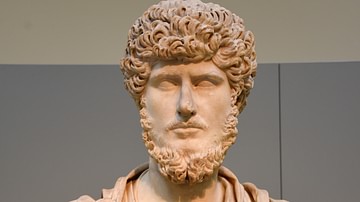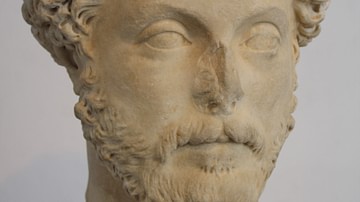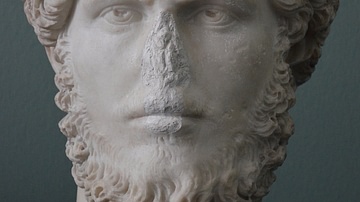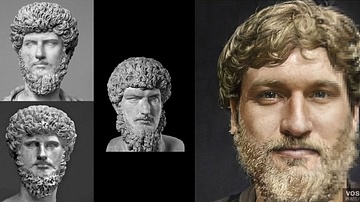
Commodus was Roman emperor from 180 to 192 CE. With the death of Roman Emperor Marcus Aurelius in March of 180 CE, the long reign of the five good emperors came to an end and with it so did the Pax Romana (the Roman Peace). Those emperors who followed for the next century would witness a time of both chaos and decline. The first of these inept emperors was Commodus, the son of Marcus Aurelius, who, according to most historians, was not only debauched and corrupt but also a megalomaniac, seeing himself as the reincarnation of the Greek god Hercules.
Early Life
Lucius Aurelius Commodus was born to the philosopher/king and Faustina the Younger at Lanuvium, a city fourteen miles southeast of Rome on August 31, 161 CE. He was the tenth of fourteen children and the only son to survive - his twin brother Titus Aurelius Fulvus Antonius died at the age of four. He would be the first emperor born while his father was the emperor and the last to inherit the throne as the previous five emperors (including Marcus) had obtained the throne through adoption.
Commodus As Emperor
It did not take long for the future emperor to become a disappointment to his father for although he enjoyed the benefits of a quality education, Commodus inherited none of his father's work ethic and would find government life tedious and some believed this gave evidence that he was illegitimate, owing to his mother's supposed affairs. After serving alongside Marcus in battle on the northern frontier in 178 and 179 CE, Commodus returned to Rome in 180 CE after his father's death (he was only eighteen) and negotiated a peace settlement, a peace surprisingly favorable to Rome. Eventually, he would leave the reins of power in the hands of others while he devoted his time to worldly pleasures. One of the first to assume some of the emperor's responsibility was Saoterus whose relationship with Commodus would soon incur the ire of those in both the Senate and imperial household.
Although Commodus considered his twelve-year-reign a new “golden age,” his lack of concern for political matters together with his life of leisure and extreme paranoia brought about what others might consider a reign of terror. Historian Cassius Dio, who called it the kingdom of “iron and rust,” wrote, “This man was not naturally wicked, but, on the contrary, as guileless as any man that ever lived. His great simplicity, however, together with his cowardice, missed the better life and then was led on into lustful and cruel habits, which soon became second nature.” Because he relied on others to rule in his place, those around him realized that he could be easily manipulated, allowing for a number of conspiracies against his life to develop - one was even initiated by his older sister Lucilla and a number of senators in 182 CE.
Lucilla believed she and her husband Lucius Verus had been passed over by Marcus Aurelius as potential heirs to the throne. The plot was simple enough: Claudius Pompeianus Quintianus, her nephew, was to lie in wait until the emperor entered the Colosseum and then stab him; however, the assassination was bungled when Quintianus raised his dagger and instead of quickly stabbing Commodus he shouted “This is what the senate has sent you.” Before he could complete his sentence, he was seized by the Praetorian Guard. This foiled attempt upon his life, together with the recent death of the emperor's trusted chamberlain Saoterus, caused Commodus to take decisive action - those implicated in the plot were all executed. Contrary to some authors, Lucilla was not immediately executed; instead, she was exiled and executed much later. Commodus also took the opportunity to execute Paternus, the commander of the Praetorian Guard, who had been implicated in both Saoterus' assassination as well as Lucilla's plot.
During this traumatic time in Commodus's life, Tigidius Perennis, who had served as the joint commander of the Praetorian Guard with Paternus, seized the opportunity and began to get closer to the vulnerable emperor, assuming considerable governmental power, something that allowed Commodus to pursue other interests. After his sister's plot, the emperor refused to appear in public and all communication went through the new chamberlain. Perennis took his new role seriously and proved to be both brutal and efficient, eliminating any rivals to his authority while making numerous enemies along the way. As he amassed great wealth and Commodus pulled further away from governmental responsibilities, he began to believe himself to the true emperor, not Commodus, even going so far as to plot to do away with the emperor and prepare his own sons for succession. Herodian, in his History of the Roman Empire, wrote, “Perennis assumed full personal charge of the empire, driven by his insatiable lust for money, his contempt for what he had, and his greedy longing for what was not yet his.” Unfortunately, he had made one enemy, the former slave and member of the imperial household, Cleander, who would bring him to ruin. In 185 CE, through a group of 1500 soldiers returning from Britain, Cleander leaked information to Commodus of Perennis's plot to overthrow him and assume power - Perennis's execution (and that of his sons) was immediately ordered.
Cleander stepped in as the emperor's new chamberlain, and as with Perennis, Commodus was freed to return to his life of pleasure, and as with his predecessor, Cleander destroyed all opposition. Everything was for sale - senatorial seats as well as governorships, and, of course, a portion of the money went to Commodus. However, like Perennis, Cleander would not remain for long. In 190 CE a grain supply shortage would bring him down. The grain commissioner, Papeirius Dionysius, cut off all grain to the populace, blaming Cleander and his greed - Cleander has supposedly bought all the grain. The people were incensed and a few days later, while gathered at the Circus Maximus, a riot erupted. The people cried for the head of Cleander and they marched through the streets to the emperor's residence at the Villa of the Quintilli. Commodus feared for his life and when attempts to quell the mob failed, Commodus gave them what they wanted - the head of Cleander which was placed on a pole and marched through the street of Rome. Afterwards, Commodus realized that he would have to take over the reins of government himself.
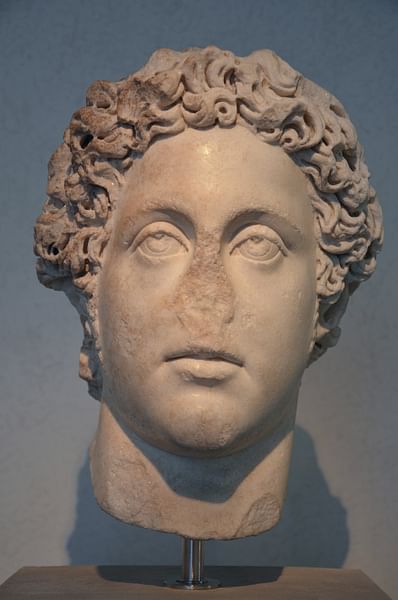
Commodus As Hercules
A new Commodus emerged, one that saw himself as a reborn Hercules who appeared in public wearing a cloak made out of the hide of a lion over his head (a reference to the Nemean Lion of Hercules's Twelve Labors). The Senate was even made to declare him a living god. Herodian wrote, “First he discarded his family name and issued orders that he was to be called not Commodus, son of Marcus, but Hercules, son of Zeus. Abandoning the Roman and imperial mode of dress, he donned the lion skin, and carried the club of Hercules. … He erected statues of himself throughout the city …. for he wished even his statues to inspire fear of him.” Next, he renamed the twelve months, and after a fire in 191 CE destroyed much of the city (including the Temple of Peace and Temple of Vesta) he seized the opportunity to completely rebuild Rome. Because he considered himself the new founder, he renamed Rome Colonia Lucia Annia Commodiana; the people became known as Commodiani. To the surprise of everyone, he even took part in gladiatorial contests, fighting against the physically handicapped and an array of beasts from a raised platform which included a tiger, an elephant and even a hippo.
Death
When he decided to fight in the arena on New Year's Day in 193 CE to celebrate the city's rebirth, his mistress Marcia (his wife Bruttia Crispina had been banished and executed in 191 CE) as well as his new chamberlain (Electus) and new commander of the Praetorian Guard (Quintas Aemilius Laetus) realized he had gone too far. After they failed to talk him out of his ridiculous plans, he became incensed and threatened to add their names to a long list of people he wanted executed. Later, as usual, Marcia brought Commodus a glass of wine prior to his bath; however, this time it was laced with poison. When the poison failed, Commodus's fitness coach, Narcissus (a professional wrestler by trade) entered and choked him to death. Although many wanted to drag his body through the streets of Rome, Pertinax (who oddly enough would succeed Commodus) seized the body, prevented its desecration and, finally, Commodus was laid to rest in Hadrian's Mausoleum.


